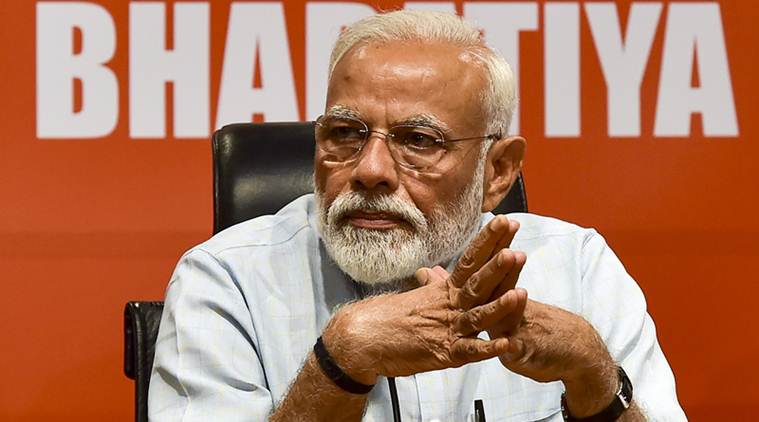
Taking forward his 2014 message of simplifying and streamlining government processes and rules, Prime Minister Narendra Modi used examples of taxi aggregator Uber and private cell phone companies Monday to tell secretaries of central ministries about how government should focus on ease of living for citizens.
Modi was meeting the secretaries for the first time in his second term. “The Prime Minister made the point that governance should be what makes life easier for citizens. He used the example of Uber, which he said has ensured that people are not dependent solely on the public transport system and made their lives easier, and that of private mobile companies which gave people options other than the department of post and telegraph,” said a source who was present in the meeting. “The focus, he said, should be on ease of living for people and not to get into all aspects of their lives.”
The point about the need for government to be a “development authority” rather than a “regulatory authority” was also made by one of the secretaries present, who highlighted the fact that the government is saddled with several rules that cannot be implemented, so there is a need for the government to “get out of the system”. The secretary was quoted as saying “saral kar diya par sugam nahin kiya (made simple but not easy)” with respect to rules and governance in general.
Sets the tone for the new government
The meeting is expected to set the tone for the government’s priorities, much like his first one on June 4 2014. Then, he had first articulated his vision of technology as a governance tool and simplicity as its motto. Such meetings with secretaries, which have been a regular feature of the government apart from the usual departmental review meetings, are a forum to exchange ideas between bureaucrats and senior ministers.
Setting one long-term and one short-term goal for every ministry, Modi told secretaries to prepare a five-year plan document for each ministry with well-defined targets and milestones and to take approval, within 100 days, for one “significant impactful decision”.
Following the meeting, Modi also interacted with some secretaries who did not get a chance to speak during the meeting, over tea. He asked about the Ayushman Bharat “score” – meaning the number of beneficiaries under the Pradhan Mantri Jan Arogya Yojana, at which one of the officers reminded him that the “score”, which now stands at 28 lakh, is no longer updated on a daily basis but on a weekly basis.
During the informal interaction, Modi, sources said, also bounced the idea of making all 26 million infant deliveries that happen in the country, free. At this, the officer in question reportedly told him that to do so would be essentially a question of how much money is available.
The PM’s meeting at Lok Kalyan Marg was a similar to an interaction he held in 2014 immediately after taking charge for the first time when he urged bureaucrats to simplify and streamline administrative rules and procedures to make them people-friendly.
Defence Minister Rajnath Singh, Home Minister Amit Shah, Finance Minister Nirmala Sitharaman and MoS PMO Dr Jitendra Singh were also present. Cabinet Secretary P K Sinha, in his opening remarks, spoke of how the PM has interacted directly with all officers up to Director and Deputy Secretary level, in the previous tenure of the government.
The Prime Minister also recalled his first such interaction with the secretaries in June 2014 — a meeting that was held after a gap of eight years. He said the recent Lok Sabha elections have been marked by pro-incumbency, for which credit must go to the entire team of officials, which worked hard, conceived schemes, and delivered excellent results on the ground, over the last five years.
The elections this time, he said, were a “positive vote” that is based on the trust of the common man. But he also warned about the “huge expectations” that come with such trust, which is an opportunity, not a challenge.
Every department of the Union government and every district of each state has a role to play in making India a $5 trillion economy, he said. Ease of doing business and ease of living would be the focus areas of the government, he said, adding that water, fisheries, and animal husbandry, will also be important areas for the government.